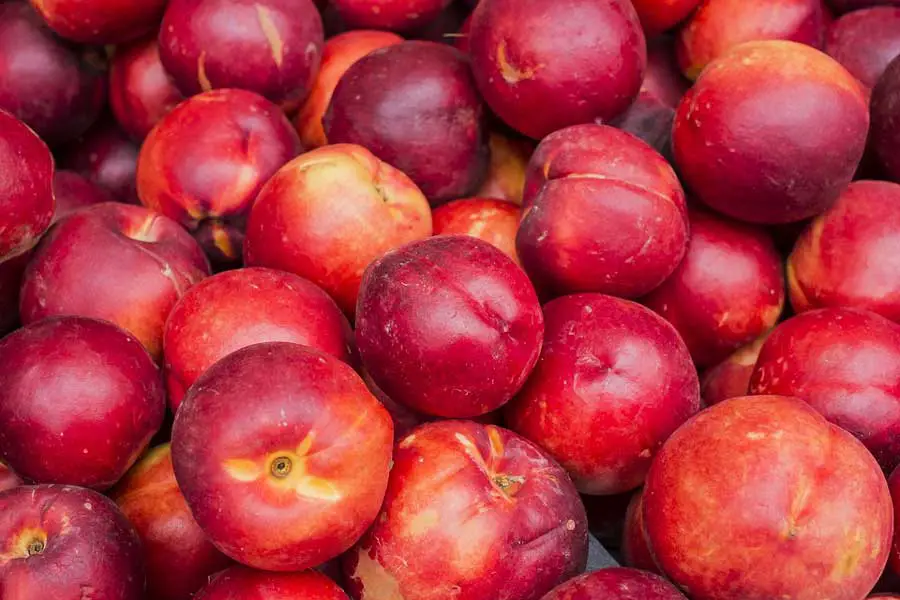Can Dogs Eat Nectarines?
A nectarine is the peach’s less fuzzy cousin. It’s sweet, juicy, and packed with many of the nutrients that we need. I never pass on the chance to buy nectarines when they are in season.
You may be considering sharing a delicious piece of nectarine with your dog. If we love nectarines this much, surely our dogs will too. But is it safe for dogs to eat nectarines?
Yes, your dog can eat nectarines. There are a lot of health benefits associated with the fruit, and they are a delicious treat. Although the nectarine fruit isn’t toxic, don’t toss your dog a whole nectarine. You’ll want to control their portion since nectarines contain a lot of sugar, and your dog should never get its mouth on a nectarine pit.
Nectarine Nutritional Value
Nectarines are a great source of many vitamins including vitamins A, C, E, K, and others.
They also contain key electrolytes, sodium, and potassium, which play a key role in cell signaling and the transmission of brain signals.
An assortment of minerals from calcium to zinc and all kinds of phytonutrients can be found in nectarines as well.
And like all fruits and veggies, nectarines contain fiber which is great for digestive health.
The nutrition contained by a nectarine contributes to many potential health benefits.
Potential Benefits
There is a long list of potential health benefits that come from eating nectarines. Among these benefits are cancer prevention, weight loss assistance, blood pressure regulation, better heart health, better digestive health, lower cholesterol levels, better immune system, better skin health, better cell health, increased eye health, lower risk of anemia, and anti-diabetic properties.
All these health benefits – and more – are provided by the long list of vitamins, electrolytes, minerals, and phytonutrients contained in a nectarine.
Even when eaten in small amounts, your dog will benefit from eating nectarines.
Potential Side Effects
If sugar is a concern for your dog, nectarines may not be the right snack for them. They contain more sugar than some packaged dog treats. Moderation is key.
Nectarines also have a lot of fiber, which is good for your dog, but it can lead to an upset stomach or diarrhea if your dog eats too much.
If your dog is experiencing diarrhea, make sure they have plenty of water to stay hydrated. An upset stomach will go away with time. Just comfort your pup and let them relax until it passes.
As with most foods, there is always a small chance of an allergic reaction. If it’s your dog’s first time trying nectarine. Give them a couple of small pieces under your supervision, and continue to monitor them for signs of an allergic reaction such as swelling, vomiting, diarrhea, or a rash. Call a vet if you think your dog is having an allergic reaction.
The nectarine pit does present a risk. It contains a small amount of cyanide. Normally, the cyanide doesn’t affect people; there is a very small concentration of the poison, and we don’t chew on the pits. But your dog may be more tempted to chew on or swallow the pit which could become a problem.
Depending on the size of your dog, the first pit might not do much damage, but toxins can accumulate in the body over time. Symptoms of cyanide poisoning can include vomiting, unsteadiness, stomach pain, and panting. If your dog has chewed or eaten a nectarine pit, call the vet.
Best Way to Feed Your Dog Nectarines
When you’re giving your dog nectarines, fresh is always best. The canned nectarines are packed with extra sugar and preservatives that your pup doesn’t need.
Also, be sure to cut up bite-sized pieces for your dog rather than giving them a whole nectarine. Doing so will reduce the risk of choking and give you control over their portion, as too much nectarine could give them an upset stomach.
It is also important not to let them eat or chew on the pit of the nectarine since it contains small amounts of cyanide. The pit, if swallowed, can also create a blockage in your dog’s digestive system.
Feed your dog a few fresh slices of nectarine from time to time, but don’t make this a regular part of their diet. Although nectarines bring a lot of health benefits, the high amount of sugar makes it a less than ideal snack option.
Final Verdict
Nectarines aren’t a treat your dog should have all the time, but there is no denying the health benefits from this juicy, delicious fruit.
Remember to keep portion sizes small and to keep the pit away from your dog.
Treat your dog to a few pieces of fresh nectarine on occasion when the tasty fruit is in season.


![Can Dogs Eat Cucumber? [Feeding Guide!]](https://atractivopets.com/wp-content/uploads/2020/08/Curly-coated-Retriever-1-768x511.jpg)

![Can Dogs Eat Tomatoes? [What You Should Know!]](https://atractivopets.com/wp-content/uploads/2020/07/Can-My-Dog-Eat-Tomatoes-768x499.jpg)


